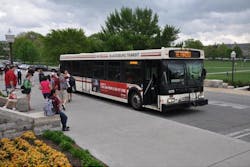Blacksburg Transit System Uses Beacon Technology To Improve Service
“Time until the next bus arrives” on the Blacksburg Transit system isn’t a guessing game for passengers anymore.
A rider with the BT4U app (Blacksburg Transit For You) can find the exact time of the next bus and even plan a crosstown bus route with their cell phone or tablet.
Help information comes up on the BT4U app on the riders’ mobile devices as they approach a major bus stop or embark onto one of the 47 full-size transit buses in the 74-mile system.
“We’re using beacon technology and mobile communication to provide our riders with a ‘Where am I at and how do I get to?’ guidance system that appears on their cell phones,” said Tim Witten, ITS manager for the Blacksburg Transit public bus system in Virginia.
One problem the beacon system is solving is the issue of riders getting on the wrong bus when four or five buses are picking up passengers at the same point. The beacons and the BT4U app tell them instantly if they’re on the right bus.
According to industry sources, the Blacksburg Transit system is likely the first publicly operated bus system in the country to be using beacons and apps to help riders get bus information.
Operated by the town of Blacksburg, the system serves 43,000 residents plus a student population of approximately 31,000 at Virginia Tech.
Providing over 3.6 million rides per year, Blacksburg Transit launched the BT4U beacon-app rider app in May 2014 and is planning to use beacon technology to not only deliver more customer information but also improve the efficiency of the overall transit system.
“Our next step is to build demand models for the number of buses and frequency for each route through the day based on riders,” said Witten who is guiding the beacon system installation for the system that offers 275 bus stops.
The BT4U system is using GeLo beacons at 50 bus stops and on all 46 busses in the bus system. The beacons send out a constant signal that triggers the app into on screen information for riders, and then delivers on-the-spot information about location, bus times and other travel information.
The mobile communication beacons also provide the Blacksburg Transit operations with data on which bus stops a rider gets on, where they disembark, and can track if riders get on another bus anywhere within the system.
“Most apps are a one-way street that only delivers information to the customer, but with beacons we can receive data on travel habits to improve the system,” Witten said, noting the travel information is collected anonymously for entry and exit points on the bus system.
Beacon communication is a new technology that triggers instant proximity information from an app to a cell phone or iPad, indoors or outdoors and without need for a WiFi connection. GeLo is a U.S. developer of mobile communication products to deliver close proximity, multimedia information to cell phones and other digital devices.
“Applications for beacons range from finding your seat at sports stadiums to getting marketing data to improve customer service,” said Al Juarez, Vice President of sales for GeLo beacons.
“We have companies that are using beacons for everything from providing multimedia information on collections at museums and galleries to keeping track of medical equipment,”
Another significant use of beacons is for marketing and advertising as beacons can deliver instant sales messages to cell phones and mobile devices in shopping environments.
Witten said Blacksburg Transit is looking at a program to engage riders in a study to improve the marketing appeal of bus advertising.
“We don’t want to use the app to advertise to riders, rather. we want to use the beacons and app to find out the effectiveness of the current advertising on the buses,” said Witten, calling the self-directed survey a fun game passengers could complete while riding a bus.
A proposed game would have passengers on buses identify advertisers on the exteriors and interior signage that appealed to them. Riders completing the cell phone game would be eligible to win prizes from Blacksburg Transit.
Another beacon project being planned by BT is to use beacons to study greenhouse gas reduction in the transit system.
“Beacon technology, as BT has deployed it, has proven to be beneficial to both the rider and BT,” Witten said.
“This is just the tip of the iceberg. The potential is there to integrate beacons into every part of our system to provide even better information to our riders,” he said.
